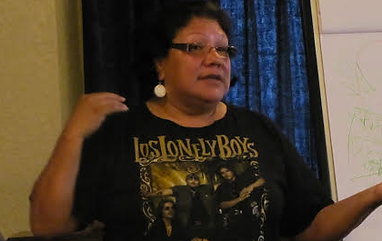
COMMUNITY SEMINARS
Over the last several years, the Pathways coalition has partnered with Sitkans Against Family Violence to offer a series of seminars that provide tools and resources for developing effective organizational prevention and addressing the root causes of violence.
Through half-day to two-day trainings we are examining where and how the “isms” show up in our community, the intersections of these issues and the impact on our overall health and safety.
These conversations build upon one another by challenging perceptions, broadening perspectives and inviting community members to be part of a “think tank” where to brainstorm fair, equitable and just community systems. For more information on any of these seminars or upcoming topics, please contact prevention@safv.org.
SOCIAL EMOTIONAL LEARNING

Social and Emotional learning (SEL) is the process through which children and adults acquire and effectively apply the knowledge, attitudes and skills necessary to understand and manage emotions, set and achieve positive goals, feel and show empathy for others, establish and maintain positive relationships, and make responsible decisions as defined by CASEL (Collaborative for Academic, Social, and Emotional Learning.
SEL programming is based on the understanding that the best learning emerges in the context of supportive relationships that make learning challenging, engaging and meaningful.
Social and emotional skills are critical to being a good student, citizen and worker; and many risky behaviors (e.g., drug use, violence, bullying and dropping out) can be prevented or reduced when multiyear, integrated efforts are used to develop students’ social and emotional skills. This is best done through effective classroom instruction and student engagement in positive activities in and out of the classroom; and broad parent and community involvement in program planning, implementation and evaluation.
In the summer of 2014, the Sitka School district administrators met with Frances Portillo, Portillo Consulting, International, to learn about SEL during a two day training session. The admin team was very positive about the training and they are currently working to develop a district-wide plan for integration of SEL into the academic setting.
DISABILITY ETIQUETTE

Disabilities and intimate partner violence are heavily intertwined: people living with disabilities are much more likely to experience multiple cases of domestic violence, sexual assault, and abuse.
Sitkans Against Family Violence (SAFV) and Southeast Alaska Indepent Living (SAIL) joined together to host a Disability Etiquette training in spring 2014. About 30 people from several local social services agencies in Sitka attended the training, led by presenter Jorden Nigro, Deputy Director of SAIL.
Participants learned appropriate language and other skills for working with survivors living with disabilities and/or vulnerable adults. We also discussed possible agency barriers and ways to make services more accessible for individuals living with disabilities.
ALASKA NATIVE DIALOGUE ON RACIAL EQUITY

Alaska Native Dialogue on Racial Equity (ANDORE) is a statewide project through First Alaskans Institute that aims to initiate, foster and grow racial healing by engaging Alaskans in meaningful conversations on race, racism and racial equity to move communities into a place of understanding, healing and growth.
In the spring of 2014, approximately 20 Sitkans from social service agencies, the Sitka School District, Sitka Tribe of Alaska, and city government participated in a half-day conversation exploring institutionalized racism.
The ANDORE facilitators brought useful tools for examining personal experiences with racism, where it shows up in Sitka and how it intersects with other social issues such as sexism, domestic violence and poverty. Participants brainstormed ways our community systems and organizational infrastructures could be more equitable and more accessible to all.
INTERRUPTING OPPRESSION

Sally Eck, M.A., from Portland State University, led a half-day workshop to service providers and school district employees on understanding social location and the intersections of oppression.
Participants reflected on whether their organizations use a socially conscious practice, whether or not services are inclusive and accessible, and how to improve the climate of the organization to best meet the needs of the individuals served.
In addition to the community conversation, Sally met with youth leaders for a train-the-trainer workshop where they learned what oppression is, how to recognize it and what to do when they see it. Additionally they learned skills to teach these concepts to their peers in an interrupting oppression workshop the very next day.
Participants in the workshop said they learned how to “interrupt,” that interrupting isn’t about being ‘right’ but valuing each other enough to engage in a respectful and less awkward conversation. They learned how to diffuse bad situations, feel more comfortable speaking up, and how to facilitate a workshop like this. They also said they will put the information they gained into action with friends, family, teachers and co-workers and use it to help others and to make everyone’s environments more comfortable and respectful.
Ms. Eck’s formal education includes a bachelor’s in sociology and one in Women’s Studies, a Master’s Degree in Education with emphasis on adult learning, antiracist and feminist pedagogies and a certificate from the Social Justice Training Institute.
EVALUATION & STRATEGIC PLANNING

Esther Smith (left), VISTA volunteer at AWARE in Juneau, and Wendi Seibold (right), President of Strategic Prevention Solutions, give a presentation about building prevention capacity.
Evaluation and strategic planning are essential in effective prevention work. In 2012 and 2013, Wendi Siebold, M.A. MPH, President and Senior Research Associate at Strategic Prevention Solutions, helped participants think about the importance of planning and evaluation in program development.
Through a mock strategic planning session, including evaluation planning, participants acquired tools and resources for effective program development and sustainability.
ALLIES TO YOUTH

In the spring of 2012, Lakota Harden, a longtime community organizer and diversity trainer from the bay area, led a half-day community workshop on how adults can aspire to ally with youth to create social change while respecting history and developing leaders for the next generation. Lakota’s workshops focus on learning to eliminate racism, sexism, and other oppression divisions. Her workshops are interactive and focus on raising consciousness about social issues, and increasing skills to meet multicultural challenges.
Since 1987, Lakota Harden has been doing motivational lectures, speeches, and diversity trainings, both locally and nationwide. “Unlearning Racism” workshops, training staff of the “New Bridges” camp, and working with youth at the Battered Women’s Alternatives has brought forth an effective extensive format for working with adults and teens from diverse backgrounds.
In addition to the Allies to Youth workshop, Lakota worked with 20 teens from all three high schools in Sitka for a half-day diversity and leadership workshop. Students explored concepts of oppression and learned how to be allies to each other. Lakota also traveled to the villages of Kake and Angoon where she spoke at school assemblies about leadership, diversity and making positive choices and led a community conversation with adults to examine the history of boarding schools and the impact on Native people.



